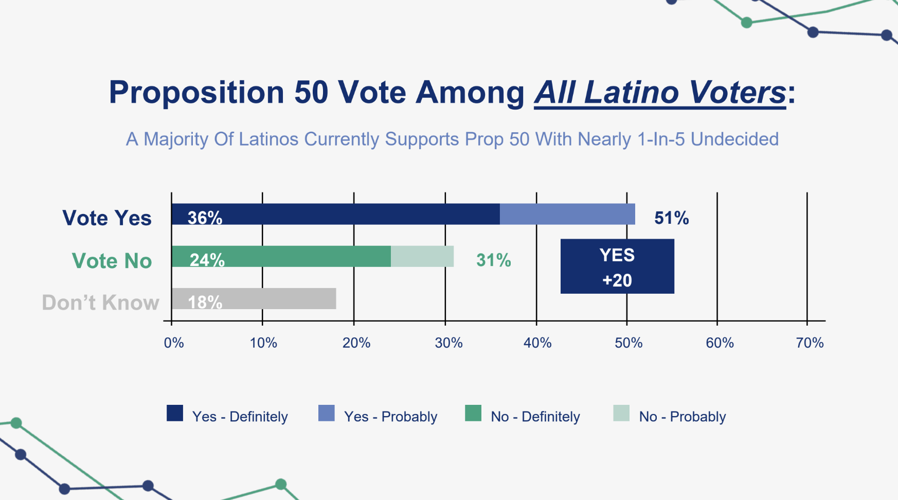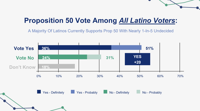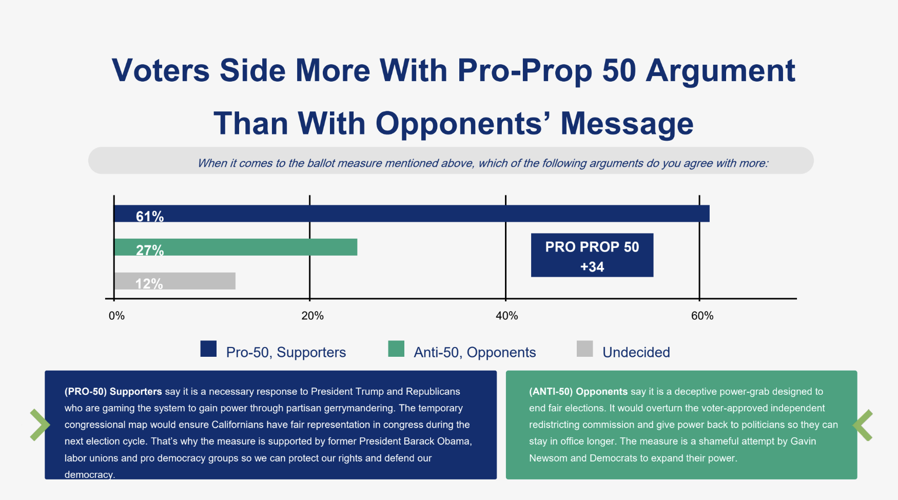
A recent poll shows 51% of all Latino voters would vote to pass Proposition 50. (Graph courtesy of Tzunu Strategies and Tulchin Research)
With less than one week until California voters say yes or no to Proposition 50, a measure which would redraw the state’s Congressional maps, new studies continue to detail that Latinos are central in this conversation.
A new poll conducted by Tzunu Strategies, a Los Angeles-based communications and government relations firm and Tulchin Research showed a narrow majority of Latinos were inclined to vote yes on Prop 50, based on the ballot’s official language. A recent report out of Cal Poly Pomona, also focused on Latinos, found the proposed map will not weaken Latino voting power. Rather, it will enhance and strengthen the voting bloc.
“We know how desperate Latinos are for real leadership and for real change,” said Arturo Carmona, CEO of Tzunu Strategies. Carmona is also CALÓ News’ publisher. He continued, “this initial phase of the poll … is part of a broader research effort to understand engagement, representation and community voice, intending to provide a rare, in-depth look at Latino voter sentiment across a range of issue areas.”
Voting behavior
Tzunu worked with Tulchin Research, a national public opinion research and strategic consulting firm, to conduct a survey of 1,100 registered Latino voters across the state between Sept. 22 through Oct. 1. The survey was multi-modal, reaching people via landline, cell phone, text and e-mail, both in Spanish and English.
The survey showed 51% of Latinos would vote “yes” on Prop 50, while 31% would vote “no” and 18% were undecided. The poll highlighted the diversity within the Latino community, once again showing Latinos aren’t a monolith and don’t always vote along party lines.
The poll showed that overwhelmingly, Latino Democrats are supportive of the measure (62% saying yes). Republicans were more unsteady in their opposition with 56% saying they’d vote no, 26% saying they’d vote yes and 18% saying they were undecided.

The poll also showed that overwhelmingly, more Latinos resonated with the Yes on 50 campaign messaging than with the No on 50 campaign. (Graph courtesy of Tzunu Strategies and Tulchin Research)
Latinos across the age, gender and generation demographics were very likely to vote yes on Prop 50. Younger and older Latino voters showed the strongest support for Prop 50, with 53% and 54% saying yes, respectively. Middle-aged voters were more split, with 46% saying yes.
The poll showed a clear gender gap as 55% of Latina women were supportive of Prop 50 compared to 45% of Latino men. Notably, across first, second and third generations, exactly half of each group said they would vote yes on the measure. First generation voters were slightly more undecided.
The poll also took a close look at a subgroup of Latinos who voted for Joe Biden in 2020, and then switched to voting for Donald Trump in 2024. Of these voters, 32% said they would vote yes on the measure, 31% would vote no and 36% were undecided.
“They are a true swing audience when it comes to Proposition 50,” said Ben Tulchin, president of Tulchin Research.
Representation
A nonpartisan, educational report conducted by Cal Poly Pomona and the Caltech Linde Center for Science, Society and Policy analyzed the impact the proposed Prop 50 map would have on Latino representation throughout the state. The study focused on how the measure would change districts that have a Latino majority and influence.
The report found the proposed map would enhance Latino voting power across the board by creating two new Latino-influenced districts while keeping the 16 districts that are already a Latino-majority intact.
The current Congressional districts, finalized in 2021 by the California Citizens Redistricting Commission, reflected population shifts identified by the 2020 U.S. Census. This map created 16 Latino-majority districts, giving Latino voters more power than ever before. The new report finds Prop 50 will only build on that momentum.
“I think when it comes to a lot of redistricting in general, most people are in the dark about how it works other than knowing that we have the Citizens Commission and then this year that we have this ballot proposition,” said Jarred Cuellar, co-author of the report and a political science professor at CalPoly Pomona. Cuellar worked on the report with Raquel Centeno of Caltech’s Linde Center for Science, Society and Policy.
The report found that the proposed Prop 50 map better reflects the population dispersion of Latinos in the state. Instead of Latino voters being extremely concentrated within the current districts, they will be spread out and given more voting power overall, across more districts.
The 42nd district, represented by Rep. Robert Garcia, is one that’s been under the spotlight during the Prop 50 campaign. The district will be redrawn so instead of going east into Downey, it would go south into Orange County.
“What that means is Latinos in Orange County and Latinos in Long Beach actually are going to have more of a say than they would have had before,” said Cuellar.
Southern California will also see the following districts change:
The Inland Empire’s 41st district, (represented by Republican Ken Calvert) would see the largest statewide gain in the Prop. 50 map, making it a new Latino-majority district.
In Orange County, Latino representation would grow with the creation of a new Latino-influence district in CA-48 (represented by Republican Darrell Issa), which rises by more than 10 percentage points in Latino voter population.
Latinos make up nearly one-third of California’s electorate, making the voting bloc essential in any measure.
“Because U.S. House outcomes in California can hinge on narrow margins, mobilizing Latino voters - especially in competitive and Latino-majority districts - can directly shape representation,” reads the report.













(0) comments
Welcome to the discussion.
Log In
Keep it Clean. Please avoid obscene, vulgar, lewd, racist or sexually-oriented language.
PLEASE TURN OFF YOUR CAPS LOCK.
Don't Threaten. Threats of harming another person will not be tolerated.
Be Truthful. Don't knowingly lie about anyone or anything.
Be Nice. No racism, sexism or any sort of -ism that is degrading to another person.
Be Proactive. Use the 'Report' link on each comment to let us know of abusive posts.
Share with Us. We'd love to hear eyewitness accounts, the history behind an article.